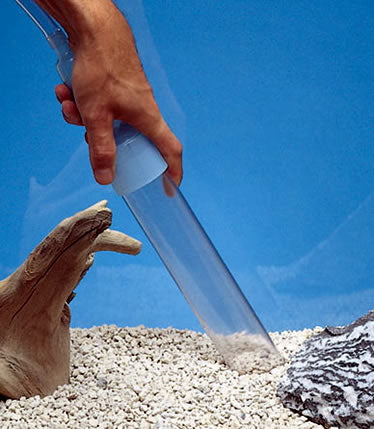- Continue Shopping
- Your Cart is Empty
How adopting a simple husbandry philosophy can have a profound impact on your aquarium!
Recently, I gave a talk at a reef hobby club meeting in, and the topic was "Nutrient Control and Export." I've given versions of this talk at some other clubs aound the nation before, as well as at a major conference a few years back, and I'm frequently surprised by how much hobbyists like it. You'd think that this topic is kind of, I dunno..dull. We know this stuff cold, right? I mean, the reality is that we are all working with this stuff daily as hobbyists...The topic is surprisingly dynamic, really. I mean, taking care of reef tanks isn't as dull as, say, brushing your teeth, is it? No- It's interesting and challenging, really.

During this talk, we touch upon such seemingly basic aquarium husbandry issues, and doing this talk for the "x-hundredth time" (along with ensuing dynamic discussion that followed) made me once again realize that there is a definitive, unwritten, yet super simple "philosophy" to aquarium husbandry that seems to be shared among the most successful aquarists that I know:
"Good things done in small measures, with frequency."
We probably don't even give it any thought as we apply this philosophy regularly. Incredibly simple words, but what do they mean to the successful aquarist?
A whole LOT, actually.

The key to ultimate long term success in the hobby is not just having the rarest hyped corals and a five-figure investment in the hottest equipment- it's the repetitive (some would even say, "dull") effort that you put in as a hobbyist to provide your animals with the best possible care. And the common thread among successful aquarists seems to be that they share that basic philosophy. Instead of knee-jerk reactions to problems like fish dying or water quality declining, they proactively avoid many of these issues by following some sort of regular husbandry regimen. Typically, this consists of modest (like 5%-10%) weekly or slightly larger (20%) monthly water changes, daily observation of major life support systems, frequent cleaning/exchanges of chemical and mechanical filtration media, and regular, but not obsessive water chemistry tests to monitor trends.
Nothing obsessive here. Right?
This stuff is really basic, but I am frequently surprised, when brought in to troubleshoot an "anomalous" tank crash or other issue, by the seemingly complete lack of regular husbandry procedures in place in the affected system. As the aquarium keeping aphorism goes, "Nothing good happens quickly in an aquarium." More often than not, in my experience- neither do BAD things! They happen (in a lot of cases) over time, and the cumulative effect is what causes the ultimate decline in many cases. Algae problems, for example, often have their roots in something simple, like bad feeding habits- just dumping heaps of frozen food (packing juices and all) right into the tank in large quantities, failure to execute water changes with any degree of frequency, allowing filter socks and other mechanical media to become saturated with detritus or organics, or the hobbyist just flat-out forgetting to change the membranes and cartridges on his/her RO unit (I can't tell you how many times this has been the cause of gradual declines in water quality).
If your source water that you use to make saltwater with sucks, well...you get the picture. Can't build a solid house with a shaky foundation, right?
And let's face it...it's time to think more about the trace elements and other compounds that comprise our water. Stuff gets used up, some is unnecessary, and some is even toxic over time. THAT is something to think about. Replenishment via direct dosing and/or water exchanges is pretty darned important.
Sure, sometimes there is a rare and very real case of a chemical poisoning incident, heater failure, etc.- but typically, most water quality (and therefore environmental quality) issues result from lack of consistency in our husbandry practices, and a certain lack of information about what exactly is happening in the aquarium. My point of this rant is not to beat you over the head with the basics, but it is to point out that a simple, consistent effort on your part will lead to greater system stabilty, animal health, and ultimately greater success as a hobbyist. Force yourself to adopt good practices-most of us already do, but apply them in manageable tasks (many of us don't- for example the "big 4 month water change" or "spring cleaning"of the tank). And do them often!

Easy...right?
A 2% twice weekly, or 5% weekly water change can make a huge difference in long term stability of your system. If you don't believe me, give it a shot for a month and see if you notice a difference in your system. l'll bet that you will. Use every means available to get a handle on what's going on in your system, and what is considered a "baseline" for it. If you know what the parameters are like when your tank is really kicking butt, you'll definitely get a better picture when something is wrong.
So get up, look yourself in the mirror, and then look at your system. Ask yourself if you are making the hobby easier for yourself by following a sporadic husbandry program, or making it harder. I'll bet that, after adopting a more regular, frequent maintenance schedule, you'll be asking yourself more "unusual" questions, like "Why did my Angelfish spawn again?", or "Dang, I have to prune that Crypt AGAIN?"
Good "problems" to have, huh?
"Good things done in small measures, with frequency."
Think about it. Stay focused, stay sharp, and most important...
Stay Wet.
Scott Fellman
Tannin Aquatics







Scott Fellman
Author